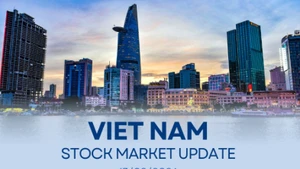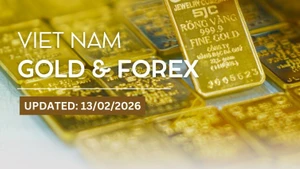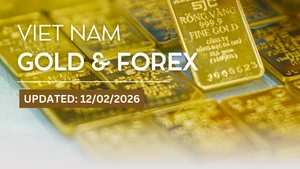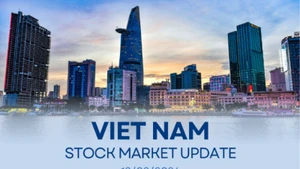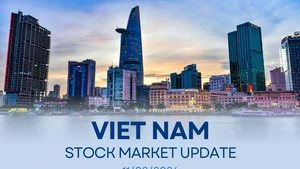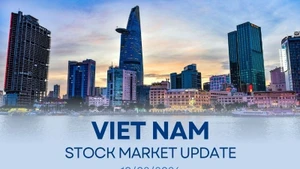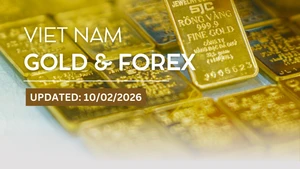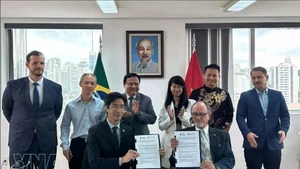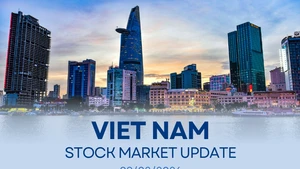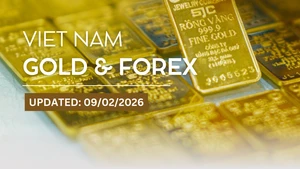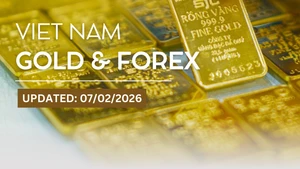Particularly, the absence of a formalised trading system has forced many Vietnamese enterprises to rely heavily on intermediaries.
Exported goods lose advantage through intermediaries
According to the General Department of Viet Nam Customs, total bilateral trade between Viet Nam and the US reached over 132 billion USD in 2024, with Viet Nam’s exports accounting for nearly 119 billion USD, up 23.3% from 2023.
In the first nine months of 2025, the General Statistics Office under the Ministry of Finance reported that the US continued to be Viet Nam’s largest export market, with export turnover hitting 112.8 billion USD.
Behind these impressive figures, however, lies a challenging reality: the majority of goods are still exported via traditional distribution channels, burdened by multiple intermediary layers and high logistics costs.
Meanwhile, trade conducted through B2B (business-to-business) e-commerce platforms represents only a small fraction of total export value to the US.
Even more concerning, under a new US government decree, a 20% countervailing duty will officially apply to goods originating from Viet Nam from August 7, 2025. This not only heightens cost pressures but also demands that Vietnamese enterprises swiftly adapt to stricter standards while seeking more legitimate and efficient market access channels.
In reality, many Vietnamese enterprises, particularly small and medium-sized ones, still struggle to meet the requirements necessary for sustainable market presence in the US. From transparency in information and traceability to ESG compliance and international certifications, all are essential “technical gateways.” Without standardisation from the outset, these criteria can become invisible barriers preventing even high-quality Vietnamese products from entering global supply chains.
According to Vu Ba Phu, Director of the Trade Promotion Agency under the Ministry of Industry and Trade, the US is not only Viet Nam’s largest export market but also its second-largest trading partner. Importantly, the US market is highly diverse: Vietnamese businesses can export products ranging from low-cost fashion items worth a few dollars to premium goods worth hundreds of dollars each, or fruits across all price segments. “The key issue,” he emphasised, “is how to export most profitably.”
Helping enterprises overcome barriers and enhance competitiveness
To address these obstacles, experts and businesses have proposed new solutions, among them, the international Viet Nam–US B2B e-commerce platform VietnamUSA.Arobid.com, which is viewed as a symbiotic initiative.
Photo: Representative of Arobid Technology Joint Stock Company introducing the international Viet Nam–US B2B e-commerce platform VietnamUSA.Arobid.com.
The platform not only connects businesses for trade but also integrates a financial, logistics, and ESG assessment ecosystem, enabling small and medium-sized enterprises (SMEs) to gradually strengthen their internal capacity.
According to Tran Van Chin, Chairman of Arobid Technology Joint Stock Company:
“VietnamUSA.Arobid.com aims to become a ‘one-stop destination for every business need’, helping enterprises overcome three core barriers—digitalisation, capital, and ESG compliance—all of which are indispensable for sustainable exports to the United States.”
Vu Ba Phu noted that the 20% U.S. tariff on Vietnamese goods—particularly agricultural products—is significantly higher than before, meaning enterprises should no longer rely on raw exports. Instead, they must focus on deep processing to increase added value, and particularly, on origin control. The VietnamUSA.Arobid.com platform will help ensure a clearer, more transparent flow of trade and exports.
“This is the advantage of joining e-commerce platforms,” Phu stressed. “Previously, Vietnamese firms had to go through importers to access the U.S. market, but B2B e-commerce enables them to reach customers under their own brands.”
Experts also agreed that product transparency is crucial for Vietnamese goods to gain a competitive edge in the US market.
According to Kris Nguyen, Founder of Ocean USA and Co-founder of VietnamUSA.Arobid.com: “To succeed in the US market, businesses cannot just think about selling. They need an ecosystem that builds global-standard capacity—from ESG documentation and traceability systems to efficient logistics corridors. Most importantly, everything must be verifiable and transparent.”
Meanwhile, Martin Doan, representative of the AGCG–High West Investment Alliance, stated: “We are not looking for large enterprises; we are looking for qualified ones. If Vietnamese companies can demonstrate capability, transparency, digital transformation, and clear traceability, we are ready to cooperate and offer flexible, convenient financial access solutions in the near future.”



